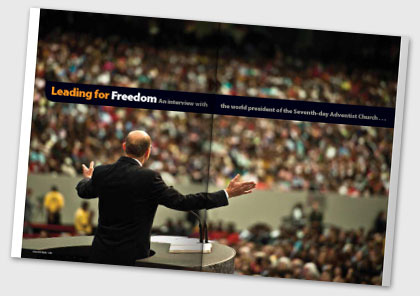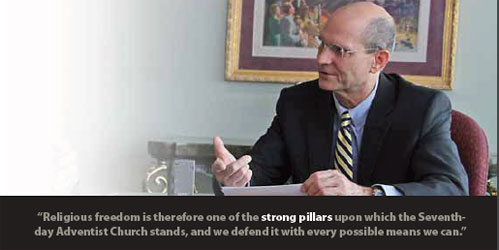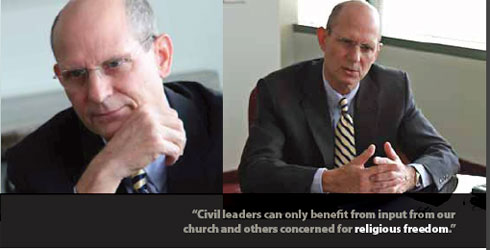Leading for Freedom
Lincoln E. Steed November/December 2010
Liberty Editor: Dr. Wilson, you were elected president of the Seventh-day Adventist Church at its world General Conference on June 25, 2010. At that time you gave a powerful sermon on the Adventist particulars. And you included religious freedom as vital to our proclamation. How do you see the religious liberty dynamic for us today?
Dr. Ted Wilson: The Seventh-day Adventist Church has distinctive beliefs. They are not originating from some august body that just decided on them; they come directly from Scripture. One of the most important areas that God has provided mankind since the beginning of time is the freedom of choice, the choice to allow a creature of God to obey Him, or not. And of course that is essentially the question that is before the universe, and the central theme of the great controversy between good and evil outlined in Holy Scripture. The devil has always been accusing God that nobody worships Him because they love Him, only because they fear Him. So when Christ came to this earth and lived a life of complete dependence on His Father, He showed us how to do that. He then died for us and paid the price for our sins so that we may have eternal life. Christ paid the price for our salvation through His blood and is actually interceding now in the Most Holy Place in the heavenly sanctuary. And all along this pathway, in this plan, we are given the power of choice.
When people are denied the power of choice, they are not truly allowed to express their full potential for belief. Naturally, Seventh-day Adventists are vigorous in protecting the religious rights of any person. Of course, we're not talking about protecting "rights" that are against God's law. We don't want to protect inappropriate things that are completely against God's law. But we protect the right of people to make a decision about God, for God, or against God. That is fundamental to the beliefs we hold as Seventh-day Adventists. Of course we want to encourage those who have the choice to believe in a loving and powerful God who has provided salvation for each of us.
 Religious freedom is therefore one of the strong pillars upon which the Seventh-day Adventist Church stands, and we defend it with every possible means we can. And we will continue to do so. It's not just a self-serving, self-preservation approach, but it is to protect the rights of every individual, to allow him or her to make this wonderful choice.
Religious freedom is therefore one of the strong pillars upon which the Seventh-day Adventist Church stands, and we defend it with every possible means we can. And we will continue to do so. It's not just a self-serving, self-preservation approach, but it is to protect the rights of every individual, to allow him or her to make this wonderful choice.
Liberty Editor: The Seventh-day Adventist Church is a truly international body of believers. I know you bring a global experience to your new role. Growing up, you spent years in Egypt and Lebanon, then later served in Africa and Russia. As you know, there are severe religious liberty challenges around the world. How do you see the interaction with Islam, with Eastern Orthodoxy, and indeed the emerging religious dynamic of Africa?
Dr. Ted Wilson: Obviously, when predominant religious organizations have access to social and political leverage, there is the potential for diminishing personal freedoms for those who may not fall into the vast majority category. I think it's important in such situations that Seventh-day Adventists take the initiative to familiarize government and other religious organizations with the beliefs we have. We must acquaint them not only with our beliefs, but also our lifestyle, our approach to life. We must communicate our understanding that life is a whole unit—physical, mental, social, and spiritual, and that's why Seventh-day Adventists are so involved in all of those areas.
When people get a better picture as to what Seventh-day Adventists believe, there's a lot better opportunity for those governments and for those other religious organizations to see that we are real people who have the best interest of society at heart, and that we are there to build up society and the nation. This way, our plea for religious freedom will be far better received. I've seen this happen; and I think Seventh-day Adventists, of all people, need to be some of the friendliest and most proactive in exhibiting who we are, what we are, what we stand for, and that we can help to build positive societies. So when it comes to different predominant religious groups in an area, I think we must reach out and interact in a dynamic way. I'm not talking about ecumenism in the sense of merging our religious identity. I'm talking about how we explain ourselves, and helping people to know who we are. When people identify who we really are, I am confident they will see us as a positive part of society.
Liberty Editor: The SDA Church has historically promoted the separation of church and state, which is constitutionally mandated in the United States. And we can give a strong biblical model for that. Do you think we should be projecting the separation of church and state model all around the world?
Dr. Ted Wilson: Well, we have to be sensitive to different cultures, traditions, and governments. I think the ideal is to have a separation of church and state. We can look at history, and we can see that whenever religion and politics are closely united, many people suffer. So it's simply a matter of realizing differences of influence in their own sphere, but it's better to have a separation, thereby guaranteeing a freedom of conscience for all.
Liberty Editor: When I first came to the United States as a teenager I attended Takoma Academy in Takoma Park, Maryland, near the Seventh-day Adventist Church headquarters—and found that many of my new classmates were the children of leaders there. You were in that class, and your father, who later became General Conference president, was at the time president of the North American Division of the church. As a child of the church, so to speak, how would you characterize church development since then, and what do you see as our challenges?
Dr. Ted Wilson: Yes, I remember you coming to Takoma Academy. I remember us playing soccer together. You had just come from Australia, so of course you played pretty well. Some of us were still learning, but we had a lot of fun.
As far as the development of the church, it has expanded numerically from an organizational standpoint. And from an evangelistic standpoint, it's grown. Somewhat naturally there are organizational challenges, a matter of polarization regarding culture or regional approaches to things. Unfortunately, I've also seen, a more pluralistic approach to theology, to lifestyle standards. We have to recognize that we do need to give and take. We need to be careful in how we relate to each other. We need to respect each other, giving preference one to another, as Scripture tells us. And yet we cannot sacrifice principle. So as the church has expanded certain social values have deteriorated. The church is a part of society, whether we like it or not.
But I am very positive and very optimistic about the future because I know the end of the story. Scripture assures me of the prophetic destiny for those who answer the biblical challenge to stand for God. God has His hand over all, and I'm not worried. Yes, we'll go through challenges and problems. But the activity of the church and its unity is only by the power of the Holy Spirit—God's promised power. We've got plenty of challenges: social, educational, institutional challenges, religious liberty problems—all kinds of challenges. But when you rely on the Lord and remember His promise to take us through, it gives you a large measure of comfort.
Liberty Editor: Religious Liberty for Seventh-day Adventists has always been joined to our sense of prophetic fulfillment. Do you see a special urgency to our times and is there a looming religious liberty "moment"?
Dr. Ted Wilson: We know from an understanding of the biblical book of Revelation that there will come a time when freedom of conscience will be greatly curtailed. We don't like to over-emphasize that understanding, because we enjoy freedom now in the United States. And we are very grateful to the Constitution and to the government of the United States for that wonderful provision of religious liberty. It is embedded in the very foundation of this country, prior even to the formal establishment of this government. From the very beginning, this wonderful land received people who wanted a place where they could, in freedom and in a setting of real conscientious endeavor, be able to worship and to live as they pleased. And most of those people were wanting to do that in accordance with what Scripture was telling them.
Liberty Editor: They varied in their application, though.
Dr. Ted Wilson: Exactly. And many other governments in the world have provided this extremely valuable facet of life that provides for the growth and prosperity of their countries; that is, freedom of conscience and freedom of religious exercise. And when a country does that, they are blessed of God, and they prosper, and we thank the government. However, we know from Bible prophecy that at some time in the future, for perhaps a variety of reasons (and we can only conjecture about those—what will trigger them, we're not sure exactly), a number of factors will come together that will begin to curtail freedom not only in this country but in other places. I think that's always a threat, and as they say, eternal vigilance is the price of freedom, particularly religious freedom. That's why we have Liberty magazine; that's why our church has a Public Affairs and Religious Liberty Department. We need to be constantly on guard and aware.
Liberty Editor: As you know, and you've brought up Liberty magazine, Liberty has been sent out for a long time to thought leaders, politicians, lawyers, community leaders, mayors, and so on. But curiously, not too many Adventists themselves read Liberty magazine. We send out nearly 200,000 copies each issue, but of that number we can only identify maybe 14,000 to 18,000 going directly to Seventh-day Adventists, which is phenomenal. How do you think we can raise our own members' personal knowledge of religious liberty issues?
Dr. Ted Wilson: Well, whenever there is a particular initiative with the government or with the community that captures the attention of church members, that immediately raises the consciousness of many church members. So it's kind of an ebb-and-flow situation . I know you have a television program, you take speaking appointments, you have a radio program. You have an annual Liberty Dinner in Washington, D.C. That all relates to the existence of Liberty magazine, which can raise the consciousness of people. As far as church members are concerned, I think periodic articles in our internal church papers like Adventist Review and Adventist World are a good way to raise a religious liberty awareness. We need to use the Hope TV Channel and Adventist World Radio, which have a huge global reach. It is important to remember, religious liberty is not just peculiar to Seventh-day Adventists, as we've already indicated. It is something that we should continue to champion for the world at large.
Liberty Editor: Most people think well of religious liberty. They say that they believe in religious liberty. But the test is in the application of this principle. Some people want it for themselves but not for others. If it is a good principle, it must be for all!
Dr. Ted Wilson: Exactly. And that's one thing thing that I have mentioned to other church administrators. They need to take an even greater interest in religious liberty matters, not simply depending on their designated directors to manage the details. They should become acquainted with the needs in their communities—wherever they might be in the world—and become acquainted with government officials, share with them the need for religious freedom, and be on the forefront, because this is an area of vital opportunity. At the last General Conference session, we were given greetings from the president of the United States, and it was a good opportunity to thank the country and other countries for the religious freedom we enjoy. Always keep that in the minds of people. Help them to appreciate it and also to promote it.
Liberty Editor: When speaking to religious liberty audiences I have sometimes tried to shock them into awareness by saying that there is far too much religion in the world—that religion without spirituality is one of the major problems the world faces—that there is way too little spirituality. How can the Seventh-day Adventist Church make a difference here?
Dr. Ted Wilson: I think it's a matter of a person's relationship with God. If you understand that you are saved by grace, you are completely dependent and indebted to a powerful God who has not only created you but has redeemed you. When that happens, life does not take on a mechanistic, legalistic approach. But it takes on a dynamic that is Spirit-filled because of your gratefulness and your complete surrender to God. And when that happens, Christianity in theory becomes practical Christianity.
There is a saying that there is more religion in a loaf of bread than one might think. We must tell people that Christianity can make a real difference in life. When you're helping someone who's in real need, an orphan or a widow, or when you're helping people who have lost their job, helping someone who has some basic needs, someone in prison, someone who is having trouble in their own home with their marriage—wherever it might be, when you're actually helping people, that's where true Christianity, practical Christianity, comes in.
Liberty Editor: And that's the sort of religion that will influence others, that will be attractive, and not polarizing. I know you've come regularly to the annual Religious Liberty Dinner and spoken at our first North American festival of religious freedom in Hawaii. How do you think we should continue to relate to civil leaders? We try to attract them to special events. Are you encouraging us to continue this type of contact?
Dr. Ted Wilson: Completely and wholly, I support that. The more that we make people aware of our concerns for the population at large and also for individuals who are in need, the better people will understand. Many times people and civil leaders can make decisions without knowing the real facts. Civil leaders can only benefit from input from our church and others concerned for religious freedom. It will contribute to a breadth of information necessary for balanced public policy. It is important to meet government leaders, to share with them the humanitarian and the spiritual things that our church is doing. That way they'll get the full picture, a positive picture.
Liberty Editor: A few months ago, with Dr. John Graz, the director of Public Affairs and Religious Liberty for the world church, I visited with Dr. Ramos-Horta, the president of newly independent East Timor. Dr. Ramos-Horta made an interesting comment. "Religion can be divided up," he said, "but East Timor is for everyone." How does that strike you?
Dr. Ted Wilson: Well, I'll take it in the most positive light, hopefully interpreting it as he meant it. There is beauty in the diversity in many countries and in many settings. If individuals are able to maintain their convictions, whether they may be religious, political, philosophical—if the state will guarantee the right for people to have that belief—it will create a richer opportunity for everyone to benefit from that state. That's what I would understand, and I would concur with him totally.
Liberty Editor: No country should be pushing for religious uniformity. There's a richness in religious diversity, and religious liberty guarantees the right of people to believe something that some other person might find somewhat hard to accept—but the right to believe should be unquestioned.
Dr. Ted Wilson: We have certain beliefs from the Bible that we wish everyone would understand, accept, and believe. But we would not want to force that on anyone. That is the essence of religious liberty.
Article Author: Lincoln E. Steed
Lincoln E. Steed is the editor of Liberty magazine, a 200,000 circulation religious liberty journal which is distributed to political leaders, judiciary, lawyers and other thought leaders in North America. He is additionally the host of the weekly 3ABN television show "The Liberty Insider," and the radio program "Lifequest Liberty."